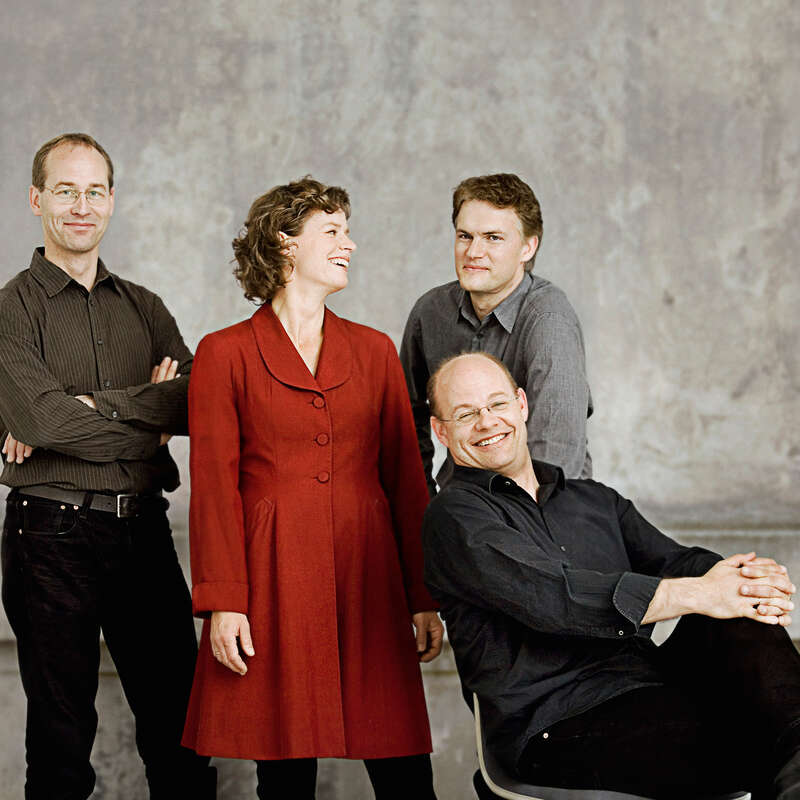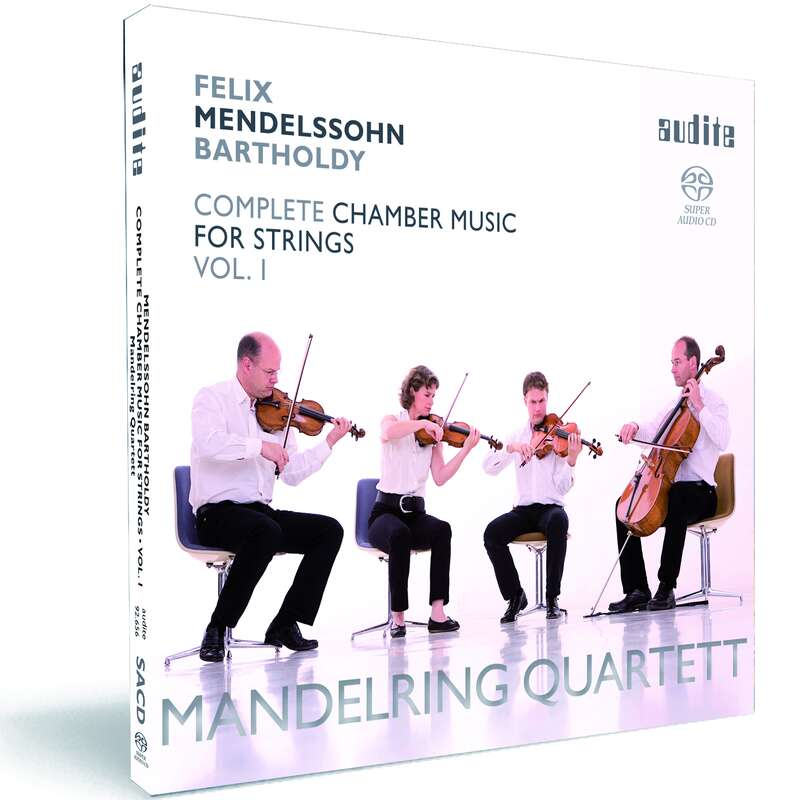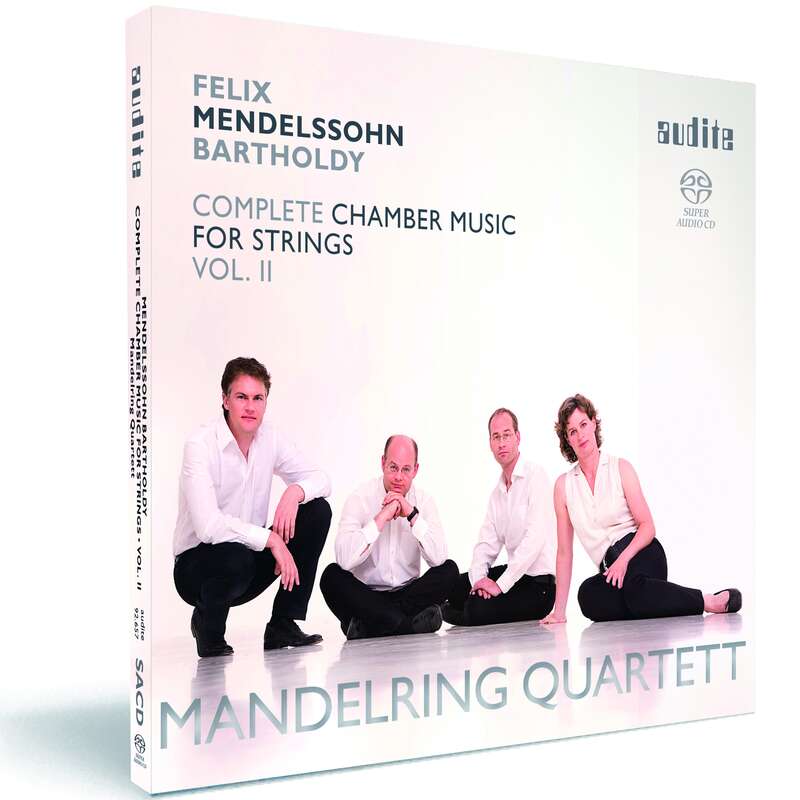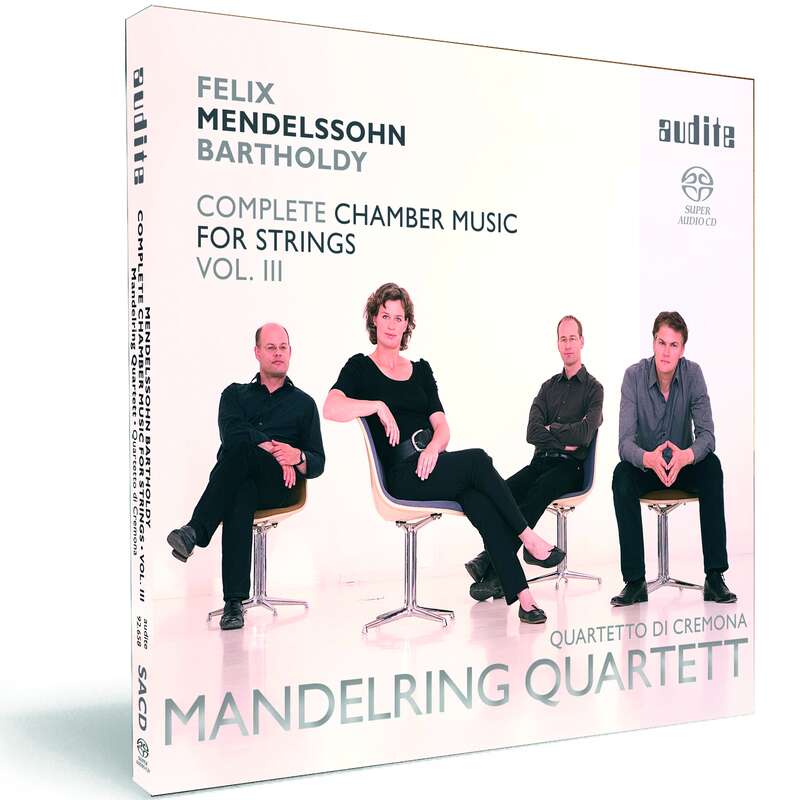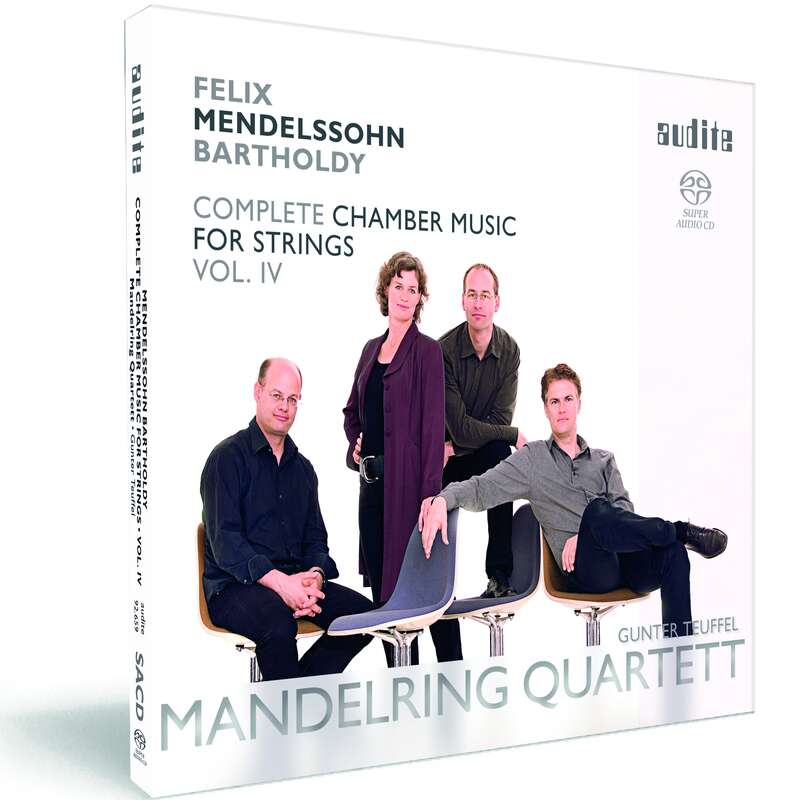Felix Mendelssohn Bartholdy's string quartets embody a musical romanticism as appears in the hymns of Novalis or the novelettes of Eichendorff: the whisper of nature, sometimes dramatically agitated, permeated by deeply felt songs. In its complete edition, the Mandelring Quartet dedicates itselfmore
"There is a lot in the authenticness of this performance to suggest that the way they play these pieces is the only way to play them." (Gramophone)
Track List
Multimedia
- Supersonic Award_Pizzicato 102012
- Report Hambacher Musikfest_DLR Kultur_20130602
- Announcement Hambacher Musikfest_GFdK_20130506
-
Concert Review_WDR 3 Das Konzert_20130129
Gig of Mandelring Quartet and Katarzyna Mycka on 29th January in Jülich
- Report anniversary Concert Philharmonie Berlin_RBB Kulturradio_20140116
- Report Hambacher Musikfest_DLR Kultur_20130602
- Portrait Mandelring_Ensemble - Magazin für Kammermusik_062014
- Portrait Mandelring Quartett: Crescendo_022015
- Mandelring Quartett_Radialsystem V Berlin_072014.jpg
- Final concert of the master classes_Wormser Zeitung 20141015
Informationen
Felix Mendelssohn Bartholdy's string quartets embody a musical romanticism as appears in the hymns of Novalis or the novelettes of Eichendorff: the whisper of nature, sometimes dramatically agitated, permeated by deeply felt songs. In its complete edition, the Mandelring Quartet dedicates itself to this work cycle with high-quality interpretations. In addition to the string quartets there are also the octet (together with Quartetto di Cremona) and two string quintets on this four SACDs containing series, in which Mandelring Quartet is supported by violist Gunter Teuffel.
Reviews
Muzyka21 | 6 (179) – czerwiec 2015 – rok XVI | Łukasz Kaczmarek | June 1, 2015
Taką interpretację oferuje nam właśnie zespół Mandelring Quartet. Omawiając dwa pierwsze woluminy serii zwracałem uwagę na dużą klasę artystyczną zespołu, wysoki poziom wykonania i takie jego cechy, jak niezwykła emocjonalność, dramatyzm. I nic się nie zmieniło. Zespół stara się przedstawić kompozycje Mendelssohna w możliwie najbardziej pasjonujący sposób. W grze muzyków po prostu słychać szczery zachwyt, który udziela się i słuchaczowi.Mehr lesen
Muzyka21 | 6 (179) – czerwiec 2015 – rok XVI | Łukasz Kaczmarek | June 1, 2015
Taką interpretację oferuje nam właśnie zespół Mandelring Quartet. Omawiając dwa pierwsze woluminy serii zwracałem uwagę na dużą klasę artystyczną zespołu, wysoki poziom wykonania i takie jego cechy, jak niezwykła emocjonalność, dramatyzm. I nic się nie zmieniło. Zespół stara się przedstawić kompozycje Mendelssohna w możliwie najbardziej pasjonujący sposób. W grze muzyków po prostu słychać szczery zachwyt, który udziela się i słuchaczowi.Mehr lesen
Vårt Land
| Tirsdag 20. Januar 2015 | Olav Egil Aune | January 20, 2015
Romantikkens svar på krystall
Strykekvartettene: Mendelssohn hadde vår i hodet. Vår og melankoli
Ingen, selv ikke den argeste kritiker, kan styre hvordan musikk blir spilt.Mehr lesen
Vårt Land
| Tirsdag 20. Januar 2015 | Olav Egil Aune | January 20, 2015
Romantikkens svar på krystall
Strykekvartettene: Mendelssohn hadde vår i hodet. Vår og melankoli
Ingen, selv ikke den argeste kritiker, kan styre hvordan musikk blir spilt.Mehr lesen
Vårt Land
| Tirsdag 20. Januar 2015 | Olav Egil Aune | January 20, 2015
Romantikkens svar på krystall
Strykekvartettene: Mendelssohn hadde vår i hodet. Vår og melankoli
Ingen, selv ikke den argeste kritiker, kan styre hvordan musikk blir spilt.Mehr lesen
Vårt Land
| Tirsdag 20. Januar 2015 | Olav Egil Aune | January 20, 2015
Romantikkens svar på krystall
Strykekvartettene: Mendelssohn hadde vår i hodet. Vår og melankoli
Ingen, selv ikke den argeste kritiker, kan styre hvordan musikk blir spilt.Mehr lesen
Música y Educación | 01.01.2015 | January 1, 2015
Cuarto volumen de la obra de cámara de Mendelssohn que el CuartetoMehr lesen
American Record Guide | December 2014 | Greg Pagel | December 1, 2014
Haydn, the “father of the string quartet”, never wrote a quintet for strings; nor did many classical composers (but Mozart did). As stated in theMehr lesen
Quintet 1 bears the opus number 18, though it was in fact composed after Mendelssohn’s great Octet, Op. 20. This quintet is rarely performed, possibly because it is eclipsed by the monumental Octet, but I would not call it a minor work. It is mature, yet youthful in its exuberance. As the notes tell us, Mendelssohn here is “paying tribute to Mozart in tone-color, but thinking harmonically in romantic directions”. Quintet 2 was composed almost 20 years later, and it is full-blown romanticism. It opens with a heroic theme over tremolos, and almost never loses steam. Even III, Adagio, takes full advantage of the five instruments to produce a full-bodied, broad sound. IV sounds almost orchestral. The Pieces for Quartet, Op. 81 are charming minor works discovered and published after the composer’s death.
This is Volume IV in Mandelring’s cycle of Mendelssohn’s complete chamber music for strings. I had the pleasure of reviewing Volume III (Octet, Quartet 5, and Pieces 1+2—May/June 2014), and this volume is also a delight. The Mandelring Quartet has a reputation for a homogeneous tone, and this quality is maintained when the ensemble is augmented (or doubled!). Perfect engineering, good notes. A must-have for lovers of chamber music for strings.
The Strad | October 2014 | Julian Haylock | October 1, 2014 A recording that brings out the neo-Classical side of the composer's character
These are precision-engineered performances, which delight in the composer's Mozartian deftness and structural seamlessness rather than indulge his propensity for Romantic emotional narrative. They create the ideal sound world – transparent, lighttextured, immaculately balanced, nimbly articulated – and sustain remarkably pure intonation and precise ensemble throughout.Mehr lesen
Record Geijutsu | 10/2014 | October 1, 2014
Japanische Rezension siehe PDF!Mehr lesen
Gramophone | September 2014 | Caroline Gill | September 1, 2014
This is the final volume in the Mandelring Quartet's complete survey of Mendelssohn's chamber music for strings, and as its predecessors have provedMehr lesen
It doesn't disappoint, with the contrast in outlook and maturity between the early works and their more adult examples as happily apparent as ever in the difference in character and youthful buoyancy they bring out in each. The phrasing, particularly in the slow movements, may be sinuous and sustained but the articulation remains adequately spartan to allow the music to shine through as the art it was, rather than the purely cerebral achievements of a prodigy testing out his new-found skills. It drives Mendelssohn's enthralling musical ideas with the kind of conviction that makes it difficult to turn off this disc without listening from beginning to end. It is recorded with their customary clarity, too, which adds an extra dimension to their performance, particularly in the last two movements of the Four Pieces: in the more muscular passages of the Fugue, where Mendelssohn uses its subject in repeatedly different and increasingly outlandish scenarios, and in the spontaneity of the two contrasting sections of the Capriccio.
Everything the Mandelrings have to throw at these pieces shows them to their best advantage - fleet-footed bowing, tongue-in-groove intonation and ensemble, and a sense of momentum that always drives the music in the right direction. The definitive set is complete.
www.SA-CD.net | August 30, 2014 | Polly Nomial | August 30, 2014 A fitting conclusion to the Mandelring's Mendelssohn cycle
Audite's engineering team, as ever, serve the music and the Mandelring's impeccably well. A very believable sense of positioning and presence comes across.<br /> Very strongly recommended (along with the other issues of this superb cycle).Mehr lesen
Very strongly recommended (along with the other issues of this superb cycle).
www.pizzicato.lu | 27/06/2014 | June 27, 2014 Ein Kraftwerk
Noch lange nach der letzten Note ist der Adrenalin-Spiegel hoch. Mit berstender Energie reißen uns das Mandelring Quartett und Günter Teuffel mit inMehr lesen
Hier ist kein Platz für pathetisch-romantisches Gehabe, das Innenleben der Partituren wird geradezu schonungslos aufgedeckt. Dies gelingt nur dank der totalen Hingabe der fünf Musiker, dank ihres unverbrüchlichen Einvernehmens in musikalischen Fragen und einer stupenden Quintett-Virtuosität.
Nur selten hat man Kammermusik von der ersten Note an so zupackend, innerlich aufgewühlt erlebt, so rhetorisch fesselnd als hätte man eben einen Energieriegel verschluckt. Ein krönender Abschluss dieser epochalen Mendelssohn-Integrale.
With a totally committed and highly energetic playing, the Mandelring Quartet and Günter Teuffel achieve a gripping and shaking performance. A fabulous last disc for an epochal Mendelssohn series.
Vorarlberger Nachrichten | Samstag/Sonntag, 21./22. Juni 2014 | Fritz Jurmann | June 21, 2014 CD-Tipps zur Schubertiade
Gunter Teufel an der zweiten Viola fügt sich nahtlos ins Quartett, das heuer als eines der führenden Quartette seiner Generation voll Stolz sein 30-jähriges Bestehen feiert: in packenden Interpretationen mit einem Höchstmaß an Charme und Klarheit.Mehr lesen
International Record Review | June 2014 | Michael Jameson | June 1, 2014
Mendelssohn's quintets for strings provide an engaging addendum to his string quartets and to the Octet in E flat major, Op. 20, though neither isMehr lesen
These expert and sophisticated new performances bring the Mandelring Quartett's survey of Mendelssohn's string chamber music to its close, with the same qualities of passionate and authoritative playing that distinguished previous issues in this series (Volumes I and 3 were reviewed in July / August 2012 and January 2014 respectively). The players are joined by the violist Gunter Teuffel, who is a respected chamber musician in his own right as well as being principal viola of the SWR Radiosinfonieorchester Stuttgart.
Those following this series will probably want to obtain this recording anyway, but listeners still unfamiliar with the Mandelrings' playing will find plenty to enjoy in these dedicated and attractive performances. The early Op. 18 Quintet, written in the composer's seventeenth year, shares much of the prodigal inventiveness and originality of Mendelssohn's other youthful works. Not quite as dazzling as the Octet, the Quintet nevertheless displays a remarkable assurance and formal mastery, and the Mandelrings play it with panache and commitment in this vibrantly wide-ranging SACD recording.
The later Op. 87 Quintet, however, seems to have had a more troubled gestation. Ignaz Moscheles described how the finale in particular unsettled the composer, who revised it several times, explaining that 'Mendelssohn purports that the last piece isn't good'. It may well prove that the finale is perhaps too lightweight to counterpoise the more sonorously reflective tone of the other movements, but whatever the case, Mendelssohn saw to it that the piece was not issued during his lifetime.
However, on the basis of this spirited and insightful new account, his concerns would seem largely unfounded, and the Mandelrings play the work fondly and attentively. But while this new disc of the String Quintets eclipses Hyperion's slightly edgy recording (now reissued on the budget Helios label) from the Raphael Ensemble, there's not a great deal to choose between these accounts in performance terms. Both offer well-judged, absorbing playing that lacks nothing technically, but Audite's SACD sonics bring a spatial depth and realism combined with huge dynamic range not matched by the Helios CD.
There remains another strong contender here, in the form of the Newton Classics coupling featuring the cellist Anner Bylsma's period-performance group, L'Archibudelli. Playing on gut strings, and using bows and instrumental set-ups which closely resemble those of Mendelssohn's era, L' Archibudelli's accounts have a lighter touch and a naturally expressive warmth which proves especially pleasing in the slow movements. What you don't get to the same degree, though, is the pungency of attack and sustaining power that modern practices afford, and the whole effect seems just a little undernourished by comparison with the excellent Mandelring accounts.
For the sake of completeness, Audite has found room here for two of the four posthumously issued pieces for string quartet, published as Mendelssohn's Op. 81 in 1849, the 'Capriccio' and 'Fugue'. If the latter seems to resemble a formally erudite contrapuntal study, the verve and brilliance of the former ensures that the Mandelring's Mendelssohn traversal reaches an exciting and assured conclusion. This has been a happy adventure from the start and this series must now be rated as a prime option of choice in these works. Michael Struck-Schloen's engaging booklet notes make out just as compelling a case for these marginalized works as the performances themselves. Recommended.
BBC Music Magazine | June 2014 | JD | June 1, 2014
Mendelssohn's String Quintets are hugely rewarding, rich and vital pieces. The Mandelring Quartet and Gunther Teuffel present full-on interpretations,Mehr lesen
Fono Forum | Juni 2014 | Marcus Stäbler | June 1, 2014 Expressive Glut
Mit der vierten und letzten Folge seiner Mendelssohn-Einspielung ist das Mandelring-Quartett bei den Werken angelangt, die am seltensten aufgeführtMehr lesen
Die vorzügliche Aufnahme macht die Antwort auf diese Frage nicht leichter. Gerade das zweite Quintett op. 87, 1845 entstanden, fesselt den Hörer vom ersten bis zum letzten Takt mit einer Fülle an Ideen und prägnanten Charakteren, die der Komponist zu einem Meisterwerk gebündelt hat. Vom beschwingten Walzercharme des Andante führt ein Spannungsbogen über die dramatischen Gesten im Adagio direkt bis ins Finale, dessen musikalische Stromstöße die Energie des Kopfsatzes wieder aufnehmen.
Das Mandelring-Quartett spielt hier mit genau jener expressiven Glut, die schon die vorangehenden Folgen der Mendelssohn-Aufnahme durchlodert hat, und entfacht gemeinsam mit dem Bratschisten Gunter Teuffel eine bisweilen orchestrale Klangfülle. Die reizt der Komponist im ersten Quintett op. 18 noch etwas sparsamer, aber gleichwohl bereits sehr effektsicher aus. Gerade im Kopfsatz nutzt er die Möglichkeiten der erweiterten Besetzung, um eine Steigerung von geradezu sinfonischer Kraft zu inszenieren. Umso stärker wirkt dann der Kontrast zu den elfenhaft huschenden Staccati im Scherzo und dem virtuos wirbelnden Finale. Dem Mandelring-Quartett kann man nur zum geglückten Abschluss einer hervorragenden Gesamteinspielung gratulieren. Und allen anderen Ensembles zurufen: Ran an den Speck!
Musica | numero 257 - giugno 2014 | Massimo Viazzo | June 1, 2014
l’ensemble tedesco sfoggia solidità e sicurezza tecnicaMehr lesen
Der Reinbeker | 25. Mai 2014 (50. Jahr, Nr. 10) | Peter Steder | May 26, 2014 Werke zweier Jubilare
Technische Perfektion? Selbstverständlich. Gestaltungskompetenz? Unbestritten. Besonders ohrenfällig: die Durchsichtigkeit des Stimmengeflechts. [...] Die jüngsten Einspielungen dürften auf lange Sicht den Rang von Referenzaufnahmen haben.Mehr lesen
Der Reinbeker | 25. Mai 2014 (50. Jahr, Nr. 10) | Peter Steder | May 26, 2014 Werke zweier Jubilare
Technische Perfektion? Selbstverständlich. Gestaltungskompetenz? Unbestritten. Besonders ohrenfällig: die Durchsichtigkeit des Stimmengeflechts. [...] Die jüngsten Einspielungen dürften auf lange Sicht den Rang von Referenzaufnahmen haben.Mehr lesen
Der Reinbeker | 25. Mai 2014 (50. Jahr, Nr. 10) | Peter Steder | May 26, 2014 Werke zweier Jubilare
Technische Perfektion? Selbstverständlich. Gestaltungskompetenz? Unbestritten. Besonders ohrenfällig: die Durchsichtigkeit des Stimmengeflechts. [...] Die jüngsten Einspielungen dürften auf lange Sicht den Rang von Referenzaufnahmen haben.Mehr lesen
Der Reinbeker | 25. Mai 2014 (50. Jahr, Nr. 10) | Peter Steder | May 26, 2014 Werke zweier Jubilare
Technische Perfektion? Selbstverständlich. Gestaltungskompetenz? Unbestritten. Besonders ohrenfällig: die Durchsichtigkeit des Stimmengeflechts. [...] Die jüngsten Einspielungen dürften auf lange Sicht den Rang von Referenzaufnahmen haben.Mehr lesen
http://theclassicalreviewer.blogspot.de | Wednesday, 14 May 2014 | May 14, 2014 This final instalment of the Mandelring Quartet’s Mendelssohn series for Audite makes a worthy conclusion to a cycle that must shoot to the top of any recommendation
The performances of the Quintets cannot fail to win new enthusiasts for these wonderful works. They receive a first rate recording and there are excellent booklet notes. This final instalment in this Mendelssohn series makes a worthy conclusion to a cycle that must shoot to the top of any recommendation.Mehr lesen
The Guardian | Thursday 24 April 2014 | Andrew Clements | April 24, 2014 Mendelssohn: String Quintets Nos 1 & 2, etc review – an over-serious take lacking exuberance
Mendelssohn's two string quintets, using a second viola à la Mozart ratherMehr lesen
www.amazon.de | 13. April 2014 | Charlotte Voss | April 13, 2014 | source: https://www.amaz... Vielschichtig, fesselnd, professionelle Klangqualität, renommiertes Quartett
Vielschichtige Klangfarben werden bei dieser Aufnahme erlebbar. Die Qualität ist im wahrsten Sinne des Wortes berauschend. Das renommierte MandelringMehr lesen
Musica | numero 255 - aprile 2014 | Massimo Viazzo | April 1, 2014
L’Ottetto per archi del compositore di Amburgo resta una delle sue composizioni cameristiche più piacevoli. Composto da un ancor adolescente Mendelssohn, è un lavoro che porta già stampato il marchio di fabbrica del suo autore, così fresco nell’incedere, amabile, zampillante, vorticoso. E l’interpretazione che ne danno i due complessi aggiunge al pezzo anche un buon afflato sinfonico.Mehr lesen
FA. Magazin | April 2014 | Dr. Reinhold Martin | April 1, 2014
Die Schönheit der Melodien, die der geniale junge Mendelssohn für sein Oktett erfunden hat, leidet unter dem eher nüchternen Ansatz der beiden Quartette keineswegs – vielmehr entfalten die Melodien im ungeschönt auf- und niederbrandenden Streicherchor herzergreifende Wirkung.Mehr lesen
Ensemble - Magazin für Kammermusik | 2-2014 April/Mai | Isabel Fedrizzi | April 1, 2014 Klangkultur
Das Mandelring Quartett, mehrfach schon als eines der besten Streichquartette weltweit gerühmt, bestätigt an diesem Werk mit dem festlichen Kopfsatz, dem flink huschenden Scherzo, dem weihevollen Adagio und dem stürmischen Finale einmal mehr seine herausragende Klangkultur.Mehr lesen
hifi & records | 2/2014 | Uwe Steiner | April 1, 2014
Hier tut sich das Quartett von der Weinstraße, der deutschen Toskana, mit den Italienern vom Quartetto di Cremona zusammen und bewegt mit einer südlich lichten und motorisch pulsierenden Interpretation. Nie wird das feinmaschig wuselnde und wispernde Satzgewebe orchestral verdickt. Das Streichquartett op. 44/3 wirkt mit seiner Dominanz der Primgeige beinah wie ein verkapptes Violinkonzert.Mehr lesen
www.pizzicato.lu | 31/03/2014 | Remy Franck | March 31, 2014 Mendelssohns Reden
Die vierte Folge der gesamten Kammermusik von Felix Mendelssohn mit dem Mandelring Quartett ist die würdige Nachfolgerin der drei ersten Volumes. DieMehr lesen
Die Klarheit des Klangbilds, wo kein Instrument das andere in den Klangschatten stellt, ist ein weiterer Vorzug einer singulären musikalischen Spitzenproduktion.
This 4th volume confirms our impressions from earlier releases: Mandelring’s Mendelsohn is musically and technically outstanding. Through this quartet, the composer becomes one really great orator.
The Strad | March 2014 | David Denton | March 1, 2014
Here, in its third volume of the composer’s complete chamber music forMehr lesen
Fono Forum | März 2014 | Marcus Stäbler | March 1, 2014 Mendelssohn romantisch
Mit dem dritten Teil seiner Mendelssohn-Gesamtaufnahme setzt das Mandelring-Quartett den Weg weiter fort, den es bereits in den beiden ersten FolgenMehr lesen
Gerade das Quartett op. 44.3 ist geradezu demonstrativ klassisch angelegt. Aber das betrifft vor allem die äußere Form, in der die Freiheiten der frühen Quartette zurückgenommen sind. Was sich innerhalb dieses konservativ anmutenden Rahmens abspielt, ist jedoch alles andere als brav. Zumindest in der schlüssigen Interpretation des Mandelring Quartetts. Die virtuosen Figuren im ersten Satz aus op. 44,3 etwa sind keine nette Spielerei, sondern Ausdruck einer starken Erregung und Dringlichkeit. Die Musik klingt wie unter Strom gesetzt, auch weil die Aufnahme das Spiel des Ensembles sehr direkt und griffig abbildet. Mit glühendem Ton fördern die Streicher die nervöse Gespanntheit und die Schwelgerei der Musik zu Tage. Mendelssohn ist hier ganz Romantiker und scheint die klassischen Formen bisweilen zu sprengen.
Neben dem feurigen Temperament und den gesanglichen Melodien ist auch der Elfenzauber ein Markenzeichen von Mendelssohns Klangsprache. So scheint etwa das Scherzo aus seinem frühen Streichoktett von kleinen Fabelwesen bevölkert zu sein. Gemeinsam mit den Kollegen vom Quartetto di Cremona schaffen die Mandelrings hier eine zauberhafte Szenerie. Es wirbelt, wispert, spukt und raschelt an jeder Ecke. Ein starker Auftritt, mit dem die Formation ganz klar in Richtung Referenzaufnahme unterwegs ist.
Audiophile Audition | March 1, 2014 | Lee Passarella | March 1, 2014
Powerful performances: the Manderling Quartet’s Op. 44, No. 3, gives the lie to the judgment that Mendelssohn’s middle quartets represent a step backward.Mehr lesen
Stereo | 3/2014 März | Marcus Stäbler | March 1, 2014
Gemeinsam mit den Kollegen vom Quartetto di Cremona schaffen die Mandelrings hier eine zauberhafte Szenerie. Es wirbelt, wispert, spukt und raschelt an jeder Ecke. Ein starker Auftritt, mit dem die Formation ganz klar in Richtung Referenzaufnahme unterwegs ist. Mehr lesen
Gramophone | January 2014 | Harriet Smith | January 1, 2014
The Mandelring Quartet have been garnering warm reviews for their Mendelssohn series which, enterprisingly, encompasses the complete string chamberMehr lesen
The Mandelring capture well the bustling energy of the finale of Op 44 No 3. But turn to the Zemlinsky and you'll find a lot more yearning in the quietly grave slow movement, where the Mandelring seem less inclined to withdraw to a whisper. Also particularly effective in the hands of both the Zemlinsky and the Eroica is a tautness of intent in the Scherzo. The Mandelring by comparison sound a little less focused, their phrasing less precise.
This is an issue, too, in the Octet, for which they are joined by the Cremona Quartet, who much impressed me with their Beethoven earlier this year (6/13). Among modern-day performances, those led by James Ehnes and Daniel Hope are superlative and both achieve a far greater transparency of texture and variety of colour than here. The Scherzo in the new recording is less ethereal than some and somewhat earthbound as a result; and while the last movement has both direction and energy, it sounds generalised in tone compared to the finely textured Hope and co or the vertiginously energetic Ehnes.
International Record Review | January 2014 | Michael Jameson | January 1, 2014
To date, most integral surveys of Mendelssohn's string quartets seem to have failed, for one reason or another, to entirely live up to the sum ofMehr lesen
Amongst more recent contenders, however, the three-CD survey from the Emerson Quartet on DG seems to have the most to recommend it generally, with insightful and alert playing that's at its best exquisitely refined, and recordings of impressive naturalness and clarity to boot. Still, the hard-driven scherzo and surging, unrelenting passion of the playing in the finale of the E flat major Quartet, Op. 44 No. 3 might well induce plenty of physical excitement, but the sheer vehemence of the Emerson's approach here might not tell the whole story as far as this most serious of Mendelssohn's string quartets is concerned.
However, the ongoing Mendelssohn series from the award-winning Mandelring Quartett seems to grow in stature with each successive release in its Audite survey. Volume 3 of its traversal of the complete chamber music for strings includes Op. 44 No. 3 and two of the Op. 81 pieces for string quartet, though the major inducement here will doubtless be this prodigally brilliant performance of the Op. 20 Octet for strings, in which the Mandelring players are joined by the Quartetto di Cremona.
These eight accomplished players make an ideally blended and well-balanced team and their collaboration in this youthfully brilliant and constantly engaging masterpiece could be no more effective nor felicitous. While the bounding opening movement leaps and dazzles, as it surely should, the constant attentiveness to dynamic markings means that for once, contrapuntal exchanges between the inner voices are clearly audible, so the ear is constantly being alerted to happenings in the middle registers that often pass unnoticed, simply because for once, they can actually be heard as the composer intended! After a bewitching account of the songful Andante, the final two movements will amaze as mud, as they will delight, such is the puckish effortlessness and lightness of touch in the Scherzo and the mercurial brilliance of the closing Presto.
Heard on its own, the Mandelring Quartett gives a severe and gritty reading of the E flat major Quartet, imbued with a tensile rigour and courageousness that's perhaps not what one might automatically expect to encounter in this piece, but the difference is that here the musical gestures add up to something more meaningful than the headlong, occasionally mannered rhetoric of the Emerson performance. Especially good is the Mandelring's deeply reflective yet never indulgent account of the Adagio, one of Mendelssohn's greatest paragraphs, surely, even if it requires playing as unsentimental as this to make us appreciate its full worth after the more saccharine musings of the Emersons in this movement.
In sum, this is another outstanding release in this valuable series and, as with Volume I, reviewed in July/August 2012, it may be recommended without qualification.
www.SA-CD.net | December 29, 2013 | Polly Nomial | December 29, 2013
As per usual, excellence from the Mandelring players although some may findMehr lesen
www.classicalcdreview.com | December 2013 | Robert Benson | December 23, 2013
[...] a delightful SACD of some of the composer's most charming music, impeccably played and beautifully recorded.Mehr lesen
www.myclassicalnotes.com | 20.12.2013 | December 20, 2013 Mendelssohn’s Genius
Performed by the Mandelring Quartett and the Quartetto di Cremona Mendelssohn’s Octet Op. 20 became one of the composer’s best – loved pieces. Mehr lesen
www.musicweb-international.com | 18.12.2013 | Brian Wilson | December 18, 2013
Both emusic.com and myself, having missed out on earlier volumes, have entered this series via the side door, as it were. Nor have my MusicWebMehr lesen
My only serious reservation about this fine third volume concerns the inclusion of the Octet – wonderful music, but so popular that you may well already have one or more very good recordings. Not a problem if you don’t mind acquiring another fine recording, but bear in mind the almost-complete set of Mendelssohn’s works for string quartet – all six numbered works – from the Cherubini Quartet on a budget 3-CD EMI set – review – and the even more complete Henschel Quartet on Arte Nova – review. The Arte Nova set is available only as a download, in 320kb/s mp3 from sainsburysentertainment.co.uk: the CDs are on offer for as much as £109.60 as I write.
Gesellschaft Freunde der Künste
| 29.11.2013 | GFDK | November 29, 2013
Mit dem Quartetto di Cremona
Musik: Das Mandelring Quartett präsentiert eines der beglückendsten Jugendwerke der Musikgeschichte von Mendelssohn
Seine sechs reifen Streichquartette hat Felix Mendelssohn Bartholdy nicht kontinuierlich, sondern an bestimmten Wendepunkten seiner Biografie und –Mehr lesen
War es in der Jugend die Auseinandersetzung mit Bach und Beethoven, so hat ihn später die Begegnung mit dem Ausnahmegeiger Ferdinand David inspiriert, zwischen 1837 und 1839 seine drei Quartette op. 44 zu komponieren (auf der vorliegenden SACD vertreten durch das Schlussstück in Es-Dur). Sie dokumentieren den reifen, formal sicheren Mendelssohn, der hier eine Summe seines Instrumentalwerks zieht: virtuos gesetzt (vor allem für Davids Geige), voller Farben und formaler Reize, romantisch in der Haltung.
Wir lieben Musik... weil sie uns glücklich macht
Nach der Vollendung seines Quartetts op. 80 (enthalten in Folge II der Gesamtaufnahme) blieb Mendelssohn in seinem letzten Jahr nur noch wenig Zeit, das Streichquartett zu überdenken und zu erneuern. Zwei einzeln überlieferte Sätze – ein sanft verklärtes, aber auch aufbrausendes Andante mit 5 Variationen und ein wisperndes Scherzo – hat man nach Mendelssohns Tod in das op. 81 integriert.
Dabei wirkt das Scherzo für alle Mendelssohn-Verehrer wie eine ferne Erinnerung an das Scherzo im Oktett op. 20, mit dem der 16-jährige Felix im Handstreich eine neue Gattung schuf: die „sinfonische" Streicher-Kammermusik, bei der alle „Pianos und Fortes sehr genau und deutlich gesondert und schärfer hervorgehoben werden müssen, als es sonst bei Stücken dieser Gattung geschieht." Der jubelnde Beginn des Oktetts, das romanzenhafte Andante, das elfenhaft federnde Scherzo und das rasante Fugenfinale – jeder Satz für sich ist ein Beweis für den Einfallsreichtum und die jugendliche Genialität dieses „schönen Zwischenfalls der deutschen Musik", wie Friedrich Nietzsche den Komponisten Mendelssohn einmal nannte.
Neue Zürcher Zeitung | Freitag, 15. November | wst | November 15, 2013
Streichquartette
Das Mandelring-Quartett spielt Mendelssohn
Fulminant ist gar kein Ausdruck. Wie ein Stromschlag fährt einem die Musik ins Mark, buchstäblich mit dem ersten, Herz und Hirn elektrisierenden Takt, ohne jede Vorwarnung: die Musik von Felix Mendelssohn Bartholdy, die das deutsche Mandelring-Quartett unter äusserster Hochspannung spielt, hitzig, fiebrig – brandgefährlich!Mehr lesen
KULTUR - Zeitschrift für Kultur und Gesellschaft | Samstag/Sonntag, 9./10. November 2013 | Prof. Fritz Jurmann | November 9, 2013 CD-Tipps von Fritz Jurmann
Das 1983 gegründete deutsche Mandelring Quartett, als Nachfolger des legendären Alban-Berg-Quartetts gehandelt, spielt Mendelssohns Kammermusik fürMehr lesen
The Listener - Blog für klassische Musik und mehr | 23. Oktober 2013 | Rainer Aschemeier | October 23, 2013 Mendelssohn in Perfektion
Verve und Emotion paaren sich mit technischer Brillanz und makelloser Perfektion. [...] Selten hat in den letzten Jahren Mendelssohns Streichoktett auf (SA)CD vitaler und im positiven Sinne musikalischer geklungen als hier.Mehr lesen
Mitteldeutscher Rundfunk | MDR Figaro - Take 5, 21. Oktober 2013 | October 21, 2013
Das Mandelring Quartett ist international sehr renommiert, es tritt regelmäßig in Wien, New York und Tokio auf. Viele CDs der Formation sind mit Preisen ausgezeichnet worden[...]Mehr lesen
Musica | N° 246 - Maggio 2013 | Bernardo Pieri | May 1, 2013
I Quartetti per archi sono tra le non molte opere da camera di MendelssohnMehr lesen
www.amazon.de | 23. März 2013 | Mama von zwei Mädchen | March 23, 2013 | source: https://www.amaz... Wunderbare Aufnahme
Da ich selber Streichquartett spiele und die Einspielungen des Mandelring-Quartetts sehr schätze, habe ich mir diese Aufnahme gekauft. Sie istMehr lesen
Die Zeit | N° 12, 14. März 2013 | Volker Hagedorn | March 14, 2013
»Wir sind am Ende einer Zeit«
Noch nie gab es so viele exzellente Streichquartette wie heute. Die Agentin Sonia Simmenauer misstraut diesem Boom
[Die Mandelrings] haben kürzlich Mendelssohns rasend dramatisches f-Moll-Quartett aufgenommen, Felix' Requiem für seine Schwester Fanny – und wer die scharf konturierte, fast atemlose Realistik der Deutschen mit dem zwar drangvollen, aber auch bezaubernd klangschönen Bild der Franzosen vergleicht, gewinnt einen Eindruck vom Niveau, auf dem derzeit der Quartettdiskurs läuft.Mehr lesen
Scherzo | Año XXVIII - Nº 283 - Marzo 2013 | Asier Vallejo Ugarte | March 1, 2013
Todo está tocado con delicadeza, con claridad, con transparencia, con coherencia estilística y con absoluta convicción, como si la vida les fuera en ello.Mehr lesen
Audiophile Audition | February 28, 2013 | Steven Ritter | February 28, 2013 An exceptional release of near perfect complexion
The Mandelring play these works with an unencumbered authority that borders on the definitive. Coupled with the sensational sound that Audite provides, this becomes a disc to be acquired with some degree of urgency.Mehr lesen
Stereo | 2/2013 Februar | Marcus Stäbler | February 1, 2013
[...] Dass unter dieser vermeintlich glatten Oberfläche indes sehr wohl das Leben tobt, zeigt das famose Mandelring-Quartett mit dem zweiten Teil seiner Gesamtaufnahme. Mehr lesen
Ensemble - Magazin für Kammermusik | 1-2013 Februar/März | Carsten Dürer | February 1, 2013 Im Sog gefangen
Gewohnt brillant agiert [das Mandelring Quartett] in den scharf konturierten schnellen Ecksätzen der Quartette Op. 44. Auch die Struktur wird von dem Quartett bestens herausgearbeitet.Mehr lesen
Pizzicato | N° 230 - 2/2013 | Steff | February 1, 2013 Kammermusik vom Feinsten
Auch die zweite Veröffentlichung im Rahmen einer Gesamteinspielung der kompletten Kammermusik für Streicher von Felix Mendelssohn-Bartholdy mit demMehr lesen
Das f-Moll Quartett öffnet dem Hörer eine ganz andere Welt. Hier ist das Mandelring Quartett weniger an einer linienförmigen Auflösung als einer Herausarbeitung von Spannungsfeldern und dramatischen Impulsen interessiert. Dank der wunderbar klaren Lesart der Musiker und Dank ihres durch und durch lebendigen Musizierens erlebt der Hörer geradlinige Kammermusik vom Feinsten.
Gramophone | February 2013 | Caroline Gill | February 1, 2013 Disc 2 in the Mandelring's Audite Mendelssohn survey
The Mandelring Quartet's first release in their complete cycle of Mendelssohn's chamber music for strings included the Opp 12 and 13 Quartets (10/12)Mehr lesen
There is enough ego in Mendelssohn's own writing, though, and the Mandelrings are consummately mature in how they keep his ebullient, youthful emotion under control through the perfection of their tuning and modesty in their phrasing, whether it be in the poised but excitable Op 44 – Mendelssohn's first anxious foray into proper grown-up life after the death of his father and his own marriage – or the grief-racked Op 80, where the ambitious speed of the opening movement pushes itself to such limits that it might sound out of control under other fingers but here succeeds only in emphasising the emotional desperation behind the notes.
Hessischer Rundfunk | Fr 11.01.2013, hr2-kultur │Der CD-Tipp, 13.05 – 13.30 Uhr | Dr. Gerhard Splitt | January 11, 2013
Das Mandelring Quartett ist dabei, eine Gesamtaufnahme der Kammermusik fürMehr lesen
Mitteldeutscher Rundfunk | MDR Kulturradio, Take 5 - 07. Januar 2013 | Dr. Michael Kuhlmann | January 7, 2013
Felix Mendelssohn Bartholdy führte ein Leben wie eine Kerze, die von zweiMehr lesen
Fono Forum | Januar 2013 | Marcus Stäbler | January 1, 2013
Feuer und Eleganz
[with English Translation]
Einer der Hauptvorwürfe der Nachwelt an Felix Mendelssohn lautet, er habe allzu "konservativ" komponiert. Als Beleg für diese Kritik gilt nichtMehr lesen
Schon der Beginn des op. 44, 1 schäumt förmlich über vor Energie: Hier lodert unverkennbar jenes jugendliche Feuer weiter, das der Komponist schon in seinem frühen Oktett entzündete, und das nur von den Interpreten wieder neu entfacht werden muss.
Auch die schwerelose Eleganz Mendelssohns – etwa in den raschen Binnensätzen – ist beim Mandelring Quartett in den besten Händen. Doch eben nur als eine von vielen Facetten, die bei anderen Ensembles mitunter verloren gehen. Indem die vier Streicher bei den Akzenten und Tremoli kraftvoll und mitunter auch knackig zupacken, geben sie der Musik in manchen Passagen eine schärfere Kontur, um dann wieder die elfenhaften Verwirblungen mit ganz feinem Pinsel nachzuzeichnen.
Das letzte, kurz nach dem Tod der geliebten Schwester Fanny entstandene f-Moll-Quartett schlägt einen ungleich dunkleren Ton an als fast alles, was Mendelssohn geschrieben hat. Wie die Interpreten uns hier am schmerzvoll gehetzten Vorandrängen der Musik teilhaben lassen, ist atemberaubend, nicht nur im Allegro assai.
Klanglich hätte dieses düstere Stück für meinen Geschmack stellenweise sogar noch schroffer in die Saiten gebürstet werden dürfen. Aber das bleibt der einzige Einwand gegen die dichte und sehr eigenständige Interpretation der Mandelrings.
English Translation:
Fire and elegance
One of the chief criticisms levelled at Felix Mendelssohn was that his approach to composition was too "conservative". One example quoted is his Opus 44 quartet cycle , which does indeed, for the most part, follow the classical layout. Yet underneath this supposedly bland surface something very lively is going on, and the Mandelring Quartet illustrates this to the full in the second part of its complete recording.
The very beginning of op. 44 no. 1 brims over with energy; here the youthful fire that the composer ignited in his early Octet continues to blaze unmistakably, only needing to be lit again by the performers.
With the Mandelring Quartet, Mendelssohn's gossamer elegance, for instance in the fast middle movements, is in the best of hands. But this is just one of the many facets that often elude other ensembles. In several passages, these four string players attack the accents and tremoli with great vigour and crispness, thereby giving the music a more sharply etched contour, and this contrasts with the elfin intricacies which they delineate with the finest of brushstrokes.
The F minor quartet, the last in the set, was written shortly after the death of Mendelssohn's beloved sister Fanny, and strikes a more sombre note than almost anything else he ever wrote. The way these players involve us in this grief-laden, restlessly forward-surging music is breathtaking, and not only in the movement marked "Allegro assai".
As regards tonal quality, the strings could have been bowed with even more brutality in this dark quartet. But this remains my only cavil regarding the Mandelrings' concentrated and very individual interpretation.
Starkenburger Echo
| 01.01.2013 | Dr. Christian Knatz | January 1, 2013
Ekstase und Ebenmaß
Neue CD des Mandelring-Quartetts – Nächste Woche Konzert in Bensheim
[...] Das in Neustadt an der Weinstraße beheimatete Mandelring-Quartett wahrt die Akkuratesse auch im schieren Kontrollverlust, alles gelingt bis zum Bersten emotional, nichts drängt sich dem Hörer als unerwünschte Mitteilung auf.Mehr lesen
Fanfare | December 2012 | Jerry Dubins | December 21, 2012
The Mandelring Quartet has received generally favorable reviews in these pages from others and from me. With this disc, the ensemble launches aMehr lesen
Still, if Audite lives up to its promise of giving us Mendelssohn’s “complete chamber music for strings,” the Mandelring’s survey will necessitate additional players and encompass not just the quartets, but the string quintets, the octet, the dozen or so fugues for violin, viola, and cello, and a number of rarely heard and, as far as I know, unrecorded pieces, like a Duo in D Minor for Two Violins and an Andante in B♭-Major for Violin and Cello, both listed in the updated 2009 Breitkopf & Härtel Mendelssohn work catalog compiled by Ralf Wehner. I always like to take a little poke at record labels that announce the “complete” anything by anyone. We’ll have to wait and see just how “complete” Audite’s cycle is when it’s finished.
Meanwhile, the Mandelring has included on this first installment the earliest known of Mendelssohn’s string quartets, a work in E♭-Major the composer penned in 1823 at the age of 14, just after completing his 13 string symphonies. The quartet is without opus number and was not published in the composer’s lifetime. Having long been familiar with Mendelssohn’s adolescent precocity from works like the string symphonies, the octet, and the Overture to a Midsummer Night’s Dream , we no longer express incredulity at it, but what still surprises are the scale and substance of this early string quartet. But for its fairly short fugal finale, the first three movements are lengthier than the corresponding movements in the composer’s first two published quartets which came four and six years later.
Those first two official quartets, as is well known, were published in reverse order, resulting in the E♭-Major work, op. 12, written in 1829, receiving a lower number than the A-Minor score, op. 13, which was written in 1827. But that’s a minor discrepancy, compared to the chronological disconnect between opus numbers and composition dates in Mendelssohn’s work catalog generally.
For the most part, the Mandelring’s readings tend to be less constrained by the bar line than the Emerson’s. There’s a rhythmic freedom to the Mandelring’s playing which both stretches and compresses phrases in ways that sometimes works and sometimes doesn’t. The little hesitations and pressings forward can be effective. They suggest a degree of spontaneity that’s less evident in the Emerson’s more controlled approach. But at other times, as in bars 9–10 of the Allegro tardante in the op. 12 quartet, as just one example, the quickening of the pace results in rhythmic instability, not to mention that it contravenes Mendelssohn’s “tardante” qualifier, which is taken to mean delaying or holding back.
Another thing that bothers me just a tad is the Mandelring’s tendency to schmaltz things up a bit in slow movements and slower-moving passages with, in my opinion, too many portamentos and a generous application of vibrato. When it comes to the really fast movements, namely the finales of opp. 12 and 13, technically, the Mandelring is no match for either the Emerson Quartet or the astonishing Pacifica Quartet. Coordination among the players is not as tight and, even more displeasingly, their digging in with the bows often turns the tone abrasive and coarse.
The perfect is, as ever, the enemy of the good. In a sea of Mendelssohn string quartet recordings, if the Emerson and Pacifica didn’t exist, the Mandelring would rise to the top of the food chain, but in that ocean there swim more formidable creatures. If having these works in multichannel, surround-sound format is a major incentive for acquiring this release, then you will be happy with your purchase. The recording is exemplary and the performances, despite my nitpicking, are excellent. It’s just that, in my opinion, this first volume in the Mandelring’s cycle does not improve upon either the Emerson’s or the Pacifica’s efforts.
www.SA-CD.net | December 15, 2012 | Polly Nomial | December 15, 2012
After a recital of such calibre it is wonderful to be able to report that Audite have given the Mandelring's (and us) a recording fully worthy of the playing. All the instruments have a firm, audible location, the parts are always distinguishable and the sound reflects the quartets timbre accurately.<br /> <br /> Even by the phenomenally high standards they have set themselves, this Mandelring Quartet disc must count as one of their finest achievements on disc to date.Mehr lesen
Even by the phenomenally high standards they have set themselves, this Mandelring Quartet disc must count as one of their finest achievements on disc to date.
deropernfreund.de | 07.12.2012 | Egon Bezold | December 7, 2012 Federnder Elan
Ihr musikalisches Reifezeugnis haben sie längst in der Tasche. Denn seit den l990er Jahren entzücken sie Kenner und Liebhaber mit ihrer singulärenMehr lesen
deropernfreund.de | 07.12.2012 | Egon Bezold | December 7, 2012 Federnder Elan
Ihr musikalisches Reifezeugnis haben sie längst in der Tasche. Denn seit den l990er Jahren entzücken sie Kenner und Liebhaber mit ihrer singulärenMehr lesen
Record Geijutsu | December 2012 | December 1, 2012
japanische Rezension siehe PDFMehr lesen
www.classicalcdreview.com | December 2012 | Robert E. Benson | December 1, 2012
The Mandelring Quartet (Sebastian Schmidt/Nanette Schmidt, violins; RolandMehr lesen
deropernfreund.de | 01.12.2012 | Prof. Egon Bezold | December 1, 2012 Federnder Elan
Ihr musikalisches Reifezeugnis haben sie längst in der Tasche. Denn seit den l990er Jahren entzücken sie Kenner und Liebhaber mit ihrer singulärenMehr lesen
Sunday Times | 18.11.2012 | David Cairns | November 18, 2012
The canard that Mendelssohn lost his vital spark towards the end, neverMehr lesen
Torgauer Zeitung | Donnerstag, 8. November 2012 | Uwe Grosser | November 8, 2012 Intensiver Mendelssohn
Von völlig anderem Temperament sind die Streichquartette von FelixMehr lesen
Neue Zürcher Zeitung | Freitag, 5. Oktober 2012 (Nr. 232) | F. Me | October 5, 2012 Mendelssohns frühe Streichquartette
Felix Mendelssohn Bartholdys frühe Meisterschaft schlug sich nicht nur inMehr lesen
hifi & records | 4/2012 | Uwe Steiner | October 1, 2012
Mendelssohn war bekanntlich früh reif, aber keinesfalls frühreif. DieMehr lesen
Pizzicato | N° 226 - 10/2012 | Steff | October 1, 2012 Zum Wesentlichen zurück
Die Firma Audite plant eine Gesamteinspielung der Kammermusik für Streichinstrumente von Felix Mendelssohn Bartholdy. Die erste CD beinhaltetMehr lesen
Darüber hinaus lässt das Mandelring Quartett mit seinen immer stilsicheren Interpretationen aufhorchen, und man kann sich schwerlich einen schöneren und besseren Mendelssohn vorstellen. Alles bleibt sehr klassisch und der Zeit Mendelssohns nachempfunden. Falls man sich satt an klassischen Interpretationen gehört hat, so könnte man dem Mandelring Quartett vielleicht vorwerfen, zu wenig innovativ, zu wenig persönlich zu sein. Doch auf der anderen Seite wirkt diese durch und durch ehrliche Interpretation unserer permanenten Suche nach dem 'Neuen', dem 'Anderen' in der Musik entgegen und führt uns mit allergrößter Überzeugungskraft wieder zum Wesentlichen zurück.
Darmstädter Echo
| Mittwoch, 19.09.2012 | Dr. Christian Knatz | September 19, 2012
Auf dem Weg
Das „Mandelring Quartett“ überzeugt mit vier Super Audio Compact Discs und macht mit diesen Einspielungen Lust auf die nächsten Konzerte in der Region – schon morgen etwa in Darmstadt.
Ein Genie in ein paar Takten: Der sehnsuchtsvollen Einleitung folgt inMehr lesen
Gramophone | 04.09.2012 | Caroline Gill | September 4, 2012 Start of a Mendelssohn cycle from the Mandelring
As this is the first in the Mandelring Quartet’s complete cycle of Mendelssohn’s string quartets, plain chronological order may well have been theMehr lesen
The Mandelrings make an appealingly muscular sound but without the sense of jostling egos one often hears in recordings of quartets by groups this mature. This is particularly noticeable in their even-handed approach to the intricate fugues of the two later quartets and there is, in fact, a strong feeling throughout that this music—Mendelssohn and Beethoven—is in the blood of the players. The accuracy of articulation and tuning add a further dimension of enjoyment to this sense and they always stay on the right side of sentimental, knowing what they mean and meaning what they say with enough confidence to be minimalist in how much they interfere with what Mendelssohn carefully placed on the page. This isn’t to say it’s glib or throwaway—in fact, there is a lot in the authenticness of this performance to suggest that the way they play these pieces is the only way to play them. There is a conviction to the performance that totally banishes any sense that these quartets were the on-paper achievement of a privileged prodigy whose experience lacked the kind of deprivation necessary to create great art. For those who struggle with that notion, this disc will be a welcome emancipation.
The Strad | Vol. 123, No. 1469 (September 2012) | David Denton | September 1, 2012 An ebullient recording of Mendelssohn's early music for quartet
The Mandelring Quartet, in concert or on disc, always achieves anMehr lesen
Kleine Zeitung | Sonntag, 19. August 2012 | ENR | August 19, 2012 Auftakt
Nach der Vollendung der Schostakowitsch-Reihe nimmt sich das MandelringMehr lesen
Stereo | 8/2012 August | Marcus Stäbler | August 1, 2012
Nahezu zeitgleich sind zwei verschiedene Aufnahmen derMehr lesen
Fono Forum | August 2012 | Marcus Stäbler | August 1, 2012 Jugendlich oder romantisch?
Nahezu zeitgleich sind zwei verschiedene Aufnahmen der Mendelssohn-Quartette op. 13 und 12 erschienen. Sie bescheren dem Hörer einen spannendenMehr lesen
In ihrem sehr schönen Einführungstext zur CD des Minetti-Quartetts widmet sich die Autorin Sabine M. Gruber den biographischen Begleitumständen von Mendelssohns frühen Streichquartetten. Und dafür gibt es gute Gründe: Als der Komponist mit 18 bzw. 20 Jahren seine Werke op. 13 und 12 schrieb, war er aussichtslos in die Nachbarstochter Betty Pistor verliebt. Manche Anzeichen deuten darauf hin, dass sich seine vergebliche Schwärmerei, wenn auch kunstvoll verschlüsselt, in den jugendlichen Meisterstücken niedergeschlagen hat.
So trägt das Quartett op. 12 im Autograph die Widmung "Für B.P."; im zuerst entstandenen op. 13 zitiert Mendelssohn ein eigenes Lied, das sich als Liebesbotschaft an Betty lesen lässt. Dieses Lied erklingt nicht nur zu Beginn und am Ende des Quartetts, es bildet auch die motivische Substanz, aus der das musikalische Material aller Sätze hervorwächst, und prägt damit das ganze Werk.
Natürlich lassen sich die Quartette nicht auf diesen Aspekt beschränken - sonst wären sie für uns heute auch kaum interessant, sondern bergen ein komplexes Geflecht aus ganz unterschiedlichen Bedeutungsschichten und kompositorischen Facetten. Insbesondere die Auseinandersetzung mit dem späten Beethoven hat beim frühen Mendelssohn spürbar ihre Spuren hinterlassen.
Gleichwohl spielt der biographische Subtext fraglos eine wichtige Rolle. Und der ist nun in der Aufnahme selbst eher verhalten formuliert. Das Minetti-Quartett streicht homogen, schlank und auch durchaus beseelt, wirkt aber oft ein bisschen brav, wenn es darum geht, einen eigenen Ton zu finden. Die langsamen Sätze etwa fließen relativ rasch vorbei - gemessen daran, dass sie eigentlich die Herzstücke der Liebesbotschaften sind.
Das fällt vor allem im direkten Vergleich mit dem Mandelring-Quartett auf, das seine Mendelssohn-Gesamteinspielung mit den Quartetten op. 12 und 13 (sowie dem frühen Es-Dur-Werk ohne Opuszahl) beginnt. Das deutsche Quartett nimmt sich etwas mehr Zeit, um die melodischen Schönheiten der Musik wirklich auszukosten; da sind besonders expressive Tonschritte immer mal einen Tick verzögert, wie es diese Musik sehr gut verträgt. Außerdem spielen die Mandelrings mit einem warmen, satten Ensembleklang, den das 2003 gegründete Minetti-Quartett so nicht erreicht und vielleicht auch gar nicht anstrebt.
Die jungen Österreicher interpretieren die beiden Werke eher jugendlich, mit einem Esprit, der gerade in den Rahmensätzen gut zum frischen Grundton der Stücke passt. Dagegen wählen die Kollegen vom Mandelring-Quartett meist etwas gehaltenere Tempi und geben der Musik mehr Gewicht. Dadurch klingt Mendelssohn bei ihnen voller und "romantischer", ohne dass die Transparenz verloren geht. Das Ensemble durchleuchtet die motivischen Strukturen mit liebevoller Sorgfalt und fördert dabei zugleich die innere Glut der Musik zu Tage. So erreichen die Mandelrings eine stärkere gestalterische Intensität. Sie dringen tiefer in jene emotionalen Tiefen schichten der Quartette ein, die der Booklet-Text der Minettis beschwört - hier machen sich die 20 Jahre mehr Berufs- und vielleicht auch Lebenserfahrung doch bemerkbar. Auch klangtechnisch hat die Super-Audio-Produktion des Mandelring-Quartetts die Nase vorn. Beide Aufnahmen führen uns wieder einmal vor Ohren, was für eine großartige Musik der junge Mendelssohn geschrieben hat.
Ensemble - Magazin für Kammermusik | 4-2012 August/September | Ernst Hoffmann | August 1, 2012 Mandelrings Mendelssohn
Der Klang dringt nach vorn, zieht sich unmittelbar wieder zurück, ein nochMehr lesen
http://theclassicalreviewer.blogspot.de | Wednesday, 18 July 2012 | the classical reviewer | July 18, 2012 Superb playing by the Mandelring Quartet in Mendelssohn’s String Quartets
In my blog of 28th April 2012 I wrote that Mendelssohn’s chamber music isMehr lesen
Mannheimer Morgen | 5. Juli 2012 | mewi | July 5, 2012 Fesselnde Quartette
Mendelssohns gesamte Kammermusik für Streicher, aufgenommen in modernerMehr lesen
WDR 3 | 02.07.2012, WDR3 TonArt, 15.05-17.45 Uhr | Marcus Stäbler | July 2, 2012 Mendelssohn - Minetti Quartett vs. Mandelring Quartett
Felix Mendelssohn war ein ausgesprochen frühreifer Komponist: Schon mit 17Mehr lesen
RBB Kulturradio | 02.07.2012 | Beate Stender | July 2, 2012
CD der Woche
Felix Mendelssohn Bartholdy: "Complete Chamber Music for Strings, Vol. 1"
Entweder ganz oder gar nicht. Wenn sich das Mandelring Quartett einen Komponisten vorknöpft, dann nur mit all seinen Werken. Nach seinenMehr lesen
Ambitioniert und visionär
Geschrieben im zarten Alter von vierzehn Jahren zeigt das ambitionierte Es-Dur-Quartett, dass auch Mendelssohn seine Genialität teilweise erlernen musste. Seine vier Jahre später komponierten Quartette op. 12 und 13 schlagen da schon individuellere Töne an. Orientiert an Beethovens späten Streichquartetten sind diese Werke musikalisch dichter und formal experimenteller. Für ihre Gesamteinspielung war es dem Mandelring Quartett wichtig, diese Entwicklung auf ihrer ersten CD aufzuzeigen.
Hingabe und Mühelosigkeit
Das ausdrucksstarke und klanglich vielschichtige Spiel des Quartetts zieht den Hörer sofort in den Bann. Ihr Mendelssohn klingt differenziert: von romantisch-sensibler Fröhlichkeit bis zu nachdenklichen und grüblerisch-schmerzvollen Ahnungen. Eine klug durchdachte und sehr subtile Interpretation. Doch der Verstand behält hier nicht das letzte Wort. Das Mandelring Quartett spielt mit so großer Hingabe und Mühelosigkeit, dass man sofort spürt, wie nahe ihnen diese Musik ist. Dieser Mendelssohn ist eine absolute Herzensangelegenheit.
Gramofon | 2012. NYÁR | ReA | July 1, 2012
A tematlkus koncertsorozatainak és lemezfelvételeinek köszönhetőenMehr lesen
International Record Review | July / August 2012 | Michael Jameson | July 1, 2012
It was inevitable that a work of such prodigal mastery and youthful exuberance as Mendelssohn's Octet, Op. 20 would cast a lengthy shadow over most ofMehr lesen
It's gratifying, then, to be able to give an enthusiastic welcome to the first instalment in what should, based on this evidence, comprise a first-rate traversal of Mendelssohn's complete chamber music for strings, played by the Mandelring Quartett on Audite . It already has a critically acclaimed survey of the 15 Shostakovich Quartets to its credit on this label and is more than equal to the task. Having listened again recently to its gauntly implacable, emotionally draining performance of Shostakovich's Eighth String Quartet (reviewed in October 2007), I felt it was interesting to assess its response to Mendelssohn's unimaginably different soundworld, with its associated economies of scale, style and musical vocabulary.
The survey opens with the early Quartet in E flat major, written in 1823, the composer's fourteenth year, and thus pre-dating the Octet by some two years. Issued posthumously in 1879, it was therefore never ascribed an opus number. Though essentially a student exercise, albeit one displaying remarkable technical competence, it is inferior to the other works heard here, the Op. 12 Quartet (in the same key) and the A minor Quartet, Op. 13, both of which occasionally eclipse their Classical models in their maturity and conviction. The Mandelring Quartett's captivating account of this early essay is well played throughout, though, with tightly sprung rhythms and an easy carefree manner which evinces the youthful buoyancy of the music to pleasing effect. There are some engaging touches in the lightIy handled, plaintive Adagio, with the concluding Fugue also brought to Iife vividly and affirmatively.
The A minor Quartet is perhaps even more extraordinary than the Octet, for its unexpected seriousness and depth reveals the young Mendelssohn's creative maturity and also reveals that at 18, he had already acquired a working appreciation of Beethoven's late quartets. Writing in 1827, the year of Beethoven's death, and shortly after the publication of the late quartets (1826), Mendelssohn did not, to quote Michael Struck-Schloen's insert note, 'feel paralysed but inspired by this paragon … his quartet in A minor is one of the first ever creative reactions to Beethoven's later style'.
This is a severe, impulsive and impassioned performance, immaculate in phrasing, ensemble and unanimity of purpose, and certainly among the best I've yet encountered on disc. Both outer movements, with their unsettled and stormy faster sections, are instantly suggestive of Beethoven, notably in the first violin's tremolo-accompanied recitative at the start of the finale, though it should be remembered, too, that much as the finale of Beethoven's Op. 135 attempted to resolve the question 'Muss es sein?' ('Must it be?'), so Mendelssohn also integrates into Op. 13 a fragment from his earlier song 'Ist es wahr?' ('Is it true?'), Op. 9 No. I. The Mandelring Quartett plays the A minor Quartet with unconstrained Beethovenian grandeur and severity, at once darker, stormier and more furiously insistent than the rival Emerson Quartet account, always so beautifully nuanced and fresh-minted that one felt it would be hard to beat, though in all save the puckish third-movement Intermezzo, it is the Mandelring's more palpably urgent approach that wins hands down.
No less assured and convincing, however, in Op. 13 is the excellent Henschel Quartet, which plays with equally committed intensity in the outer movements and gives a memorably eloquent performance of the heart-easing Adagio, too. However, Arte Nova's unflattering recording sounds congested and closely focused beside the spaciousness, clinical clarity and wider dynamic range of Audite's new SACD engineering. The performance of the Quartet in E flat, Op. 12 completes this new release in similarly assured and vigorous style, with the finale (a typically Mendelssohnian fleet-of-foot Allegro vivace) played with striking élan and brilliance.
Märkische Oderzeitung | Freitag, 29. Juni 2012 | p.p. | June 29, 2012 Mit Freude zu hörende Quartette
Betrachtet man die Musik nach topografischen Maßstäben, gehörenMehr lesen
Stuttgarter Nachrichten
| Nummer 143 Samstag, 23. Juni 2012 | Jürgen Holwein | June 23, 2012
Jürgen Holwein stellt neue Platten vor, die ihm wichtig sind.
M wie Mandelring
Das Mandelring- Quartett [...] verhält sich, man glaubt es kaum, wie ein Körper, angeschlossen an eine Herz-Lungen-Maschine. Nichts aber ist monsterhaft maschinell daran, wie sie sich op. 12 und op. 13 von Mendelssohn angeeignet, man müsste sagen: einverleibt haben. Mehr lesen
ORF Ö1
| Donnerstag, 21. Juni 2012, 13:00 Uhr | Gustav Danzinger | June 21, 2012
Mandelring spielt Mendelssohn
Erste CD der neuen Kammermusik-Gesamtaufnahme
Das Mandelring Quartett aus Deutschland ist in den vergangenen Jahren vor allem durch seine Gesamtaufnahme der Quartette von Schostakowitsch bekanntMehr lesen
www.concerti.de
| 18.06.2012 | Renske Steen | June 18, 2012
Aufregender Auftakt
CD-Rezension Mandelring Quartett
Zupackend, gewissermaßen mit dem Herz in der Faust spielen die vier Musiker die ersten drei Streichquartette Mendelssohns. Keine Schleifer, keine romantisierenden Hüsteleien hört man hier. Jeder Ton wird vom Kopf gespielt, die Punktierungen sind klar und deutlich.Mehr lesen
Morgenpost am Sonntag | 17.06.2012 | June 17, 2012 Neu auf dem Klassik-Markt
Wem das nicht genug ist, dem sei das Mandelring Quartett (SebastianMehr lesen
Hessischer Rundfunk | hSonntag, 17.06.2012, 10.45 Uhr | Martin Grunenberg | June 17, 2012 hr2-kultur "Kulturfrühstück": CD-TIPP
Musik: Mendelssohn: Streichquartett Es-Dur / 1. Satz [Anfang –Mehr lesen
Rondo | 09.06.2012 | Matthias Kornemann | June 9, 2012
Muss man Mendelssohn „retten“? ‒ fragt rhetorisch einer derMehr lesen
Ensemble - Magazin für Kammermusik | Nr. 3-2012 (Juni/Juli) | June 1, 2012 Mandelring Quartett beginnt Einspielung der Mendelssohn-Kammermusik für Streicher
Nach der äußerst erfolgreichen Gesamteinspielung der 15 StreichquartetteMehr lesen
Record Geijutsu | June 2012 | June 1, 2012
japanische Rezension siehe PDFMehr lesen
Bayern 4 Klassik - CD-Tipp | 31.05.2012 | Annika Täuschel | May 31, 2012 Mandelring Quartett
Muss man heute noch eine Lanze brechen für Felix Mendelssohn-Bartholdy? Sicher sind die meisten Verdienste des künstlerischen Universalisten bekanntMehr lesen
Was die Kammermusik, speziell seine Streichquartette angeht, musste man allerdings nach wirklich hochkarätigen Aufnahmen vor gut einem Jahrzehnt noch intensiv suchen. Mittlerweile sind die Quartette opp. 12 und 13 sowie die Dreiergruppe op. 44 fester Repertoire-Bestandteil zahlreicher, vor allem auch jüngerer Quartettformationen (Quatuor Modigliani, Minetti Quartett u.a.).
Mendelssohns Streicherkammermusik komplett auf CD zu dokumentieren, wie es das Mandelring-Quartett nach abgeschlossenem Schostakowitsch-Zyklus jetzt tut, verdient in jedem Fall großes Lob – viel zu interessant, bedeutend und musikhistorisch einflussreich sind die Quartette Mendelssohns, um nicht noch intensiver Gegenstand der musikalischen Auseinandersetzung und der unterschiedlichen Lesarten verschiedener Ensembles zu werden.
Schon die erste CD dieser Mendelssohn-Dokumentation des Mandelring-Quartetts überzeugt mit dem frühen Jugendwerk von 1811 und den beiden Quartetten Es-Dur und a-Moll opp. 12 & 13: kultiviert gespielt, mit souveräner Klangbalance ausgestaltet und stilsicher interpretiert vom renommierten Geschwister-Ensemble aus der Pfalz.
